DUBLIN — When Fatin Al Tamimi immigrated to Ireland in 1988, she felt like hers was the only hijab on the streets of Dublin. There weren't many other Arabs or Muslims in Ireland at that time.
"People thought I was a nun! They were always like, 'Bless you, sister,'" the educator and activist recalls, laughing.
But when her mostly white, Irish Catholic neighbors learned she was Palestinian, she says they were immediately supportive.
"They'd say, 'We know it all, we've been through that,' " Al Tamimi says. "I guess because of history, the way they were oppressed and colonized by the British. It's the same thing happening to the Palestinians."

Until 1921, what's now the Republic of Ireland was a British colony. Northern Ireland remains part of the United Kingdom. And many Irish people say their experience of British occupation — as well as their own sectarian conflict, and 19th century famine — gives them empathy and shared history with the Palestinian struggle.
Since Hamas' Oct. 7 attack on Israel, and the Israeli military operation in Gaza that's followed, Al Tamimi's Muslim headscarf and checkered Palestinian keffiyeh shawl — which might mark her out for hostility elsewhere — have prompted Irish people to offer her hugs and high-fives in the street, she says.
"Especially when they see the keffiyeh! Some of them will walk by me and say, 'Free, free Palestine!' " Al Tamimi says. "Taxis and cars beep their horns."
Ireland may be a mostly white European country, but many Irish people say they identify more with the Global South's experience of imperialism and colonialism.
"It's the same with South Africa, it's the same with South America," says Kirsten Farrelly, an activist with the group Mothers Against Genocide, which stages weekly demonstrations outside the Israeli Embassy in Dublin. "All these scars are being opened up in us, when we see what's happening to the Palestinians."
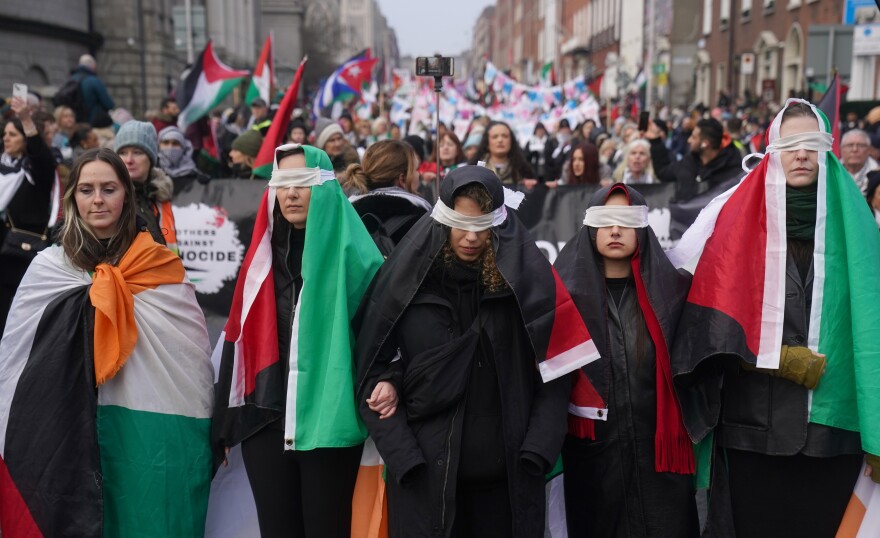
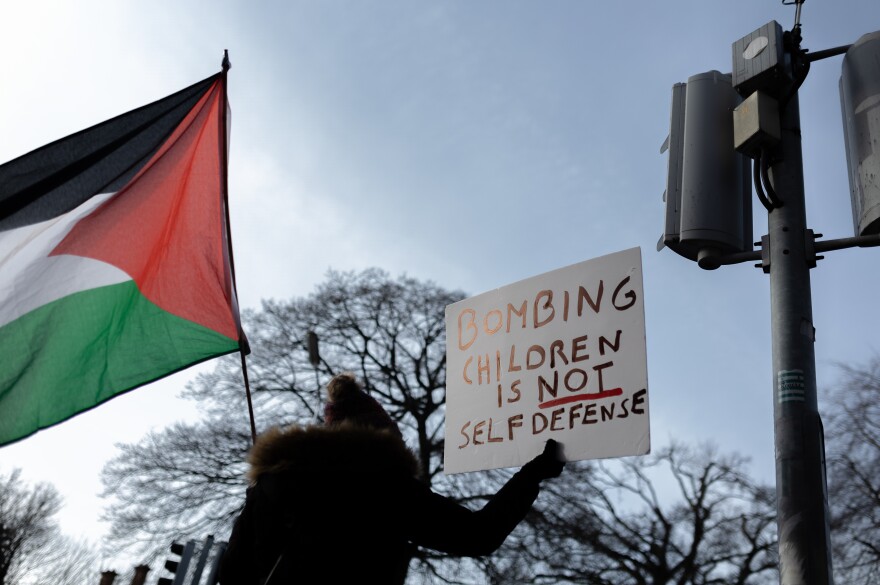
In Ireland, that translates into some of the highest public support for Palestinians. (Even more than some majority-Muslim countries, according to historical polling data.) In 1980, Ireland became the first European Union member to call for Palestinian statehood. It was also the last EU member to grant permission, in 1993, for Israel to open a residential embassy. And Irish politicians have delivered some of Europe's harshest criticism of Israel during the ongoing war in Gaza.
But it's complicated. The Catholic Church — largely silent through the mass slaughter of Jews by the Nazis — dominated Irish life until recently. And Ireland's own neutrality in World War II still casts a shadow over its relations with Israel today.
In Ireland and Palestine, the same cast of colonial characters
A little over a century ago, Ireland and Palestine were both under British control. The latter was called British Mandate Palestine, or Mandatory Palestine. Many of the same British colonial officials served in both places — and left a deep impression on locals.
For example, former British Prime Minister Arthur Balfour was most famous for something he wrote after he left that office: The 1917 Balfour Declaration, which announced Britain's support for the establishment of a "national home for the Jewish people" in Palestine, a region previously ruled by the Ottomans.
But before his famous declaration, Balfour served in the 1880s as a British Cabinet secretary for Ireland. In 1885, he opposed home rule for Ireland, and his disagreement with colleagues over the issue ultimately helped to topple a previous British prime minister's government.
And in 1887, Balfour ordered police to open fire on protesters in Mitchelstown, Ireland — killing several people, and earning him the nickname "Bloody Balfour" among the Irish.
Another thing Ireland and Palestine had in common were the Black and Tans. They were a brutal British police force named for the color of their uniforms, and infamous for killing Irish civilians in the early 20th century. After Irish independence, the Black and Tans deployed to British Mandate Palestine, where they exercised colonial power over the mostly Arab population there.

"There is a direct historic correlation. A lot of the brutality of the British Empire was practiced on Ireland first," says David Chambers, better known as Blindboy, one of Ireland's most popular podcasters.
The first British governor of Jerusalem, Ronald Storrs, made that direct parallel himself. Storrs, who served from 1917 to 1926, later wrote in his 1937 book, Orientations, that colonial tactics practiced in Ireland were implemented in the Middle East for Britain's political gain. He wrote that Jewish immigration to Palestine during those years, "if not to form the Jewish State," might also serve the purpose of "forming for England a little loyal Jewish Ulster in a sea of potentially hostile Arabism."
The word "Ulster" refers to British plantations in Northern Ireland. Storrs' idea was that a Jewish state might serve to maintain British interests in the Arab world.
Chambers says the idea of a colonial power acting out of self-interest rather than the common good is something many voices in Africa, Asia and Latin America have long called out, in both Western colonialism through the 20th century and in Israel's occupation of the Palestinian territories now.
But Ireland "is an outlier in that we're a European nation," he says. "To see white people speaking out like that, I think that does have international impact."
Many Irish people also see similarities between the Israeli-Palestinian conflict and the decades of Catholic-Protestant fighting in Northern Ireland known as the Troubles, which ended in a 1998 peace agreement.
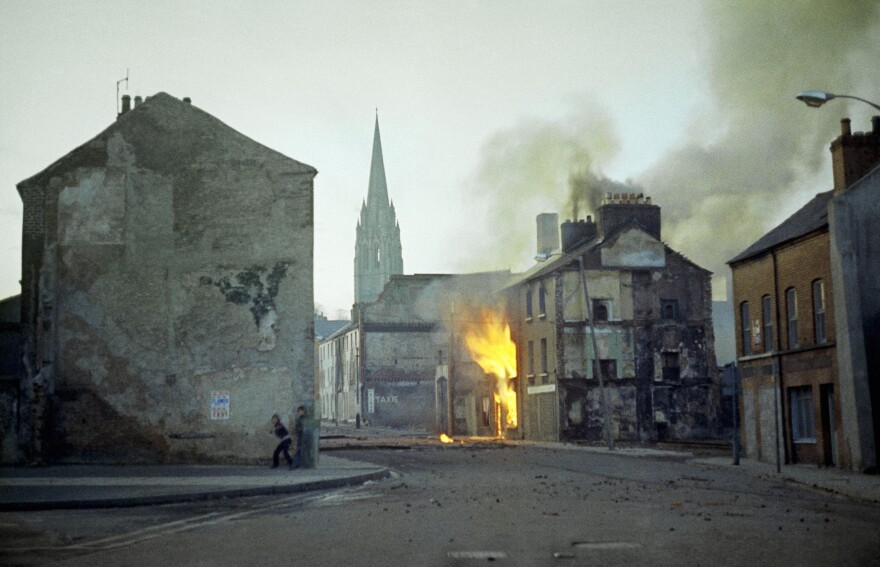
"When we [Irish people] see what happens in Palestine — people shot dead while waving white flags — that's an immediate cultural memory," Chambers says. "We saw that in the 1970s in Derry," he says, referring to Bloody Sunday, when British soldiers shot and killed unarmed protesters at a civil rights demonstration in the Northern Irish city.
"We can't turn away from this. It's our grandparents," he says.
Atop Ireland's polls, a party with historic ties to militants — and the PLO
All this history influences modern-day Irish politics.
Ireland's taoiseach, or prime minister, was one of the first European leaders to condemn Israel's military tactics in Gaza. Leo Varadkar told reporters on Nov. 3, less than a month into the current war, that while Israel has a right to defend itself, what he's been watching "isn't just self-defense."
"It looks, resembles, something more approaching revenge," he said.
Ireland has also joined Spain in asking the EU to review its trade agreement with Israel, over human rights concerns.
One of Varadkar's rivals, Mary Lou McDonald — whose political party Sinn Fein is leading polls ahead of elections later this year or early 2025 — doesn't have an Irish flag on her profile on X (formerly Twitter). But she does have a Palestinian one.
Sinn Fein has historic ties to Irish Republican Army militants, who themselves had a decades-long alliance with the Palestine Liberation Organization. McDonald has called for the Irish government to expel the Israeli ambassador over allegations of genocide in Gaza. Israel denies the allegations.
There are signs some Irish voters want to push Sinn Fein further: An online campaign is urging the party to boycott its annual St. Patrick's Day trip to Washington over the Biden administration's support for Israel.
Varadkar's government has maintained diplomatic relations with Israel.
But in a 2022 op-ed, former Israeli Ambassador Mark Regev wrote that there is an element of "anti-Israeli antipathy" in Ireland that partly stems from "traditional Catholic Church antisemitism" — something Ireland and the church deny. He also said people in Ireland view the Israeli-Palestinian conflict through what he calls a "distorted lens" portraying Israel as a colonial power.
While Ireland and the United States have both advocated for the creation of a Palestinian state alongside Israel, neither one currently recognizes the Palestinian Territories as a sovereign state. In 2018, the Trump administration closed Washington's PLO office, the Palestinians' diplomatic representation there. By contrast, Ireland hosts a Mission of the State of Palestine in its capital Dublin — with a full-fledged ambassador.
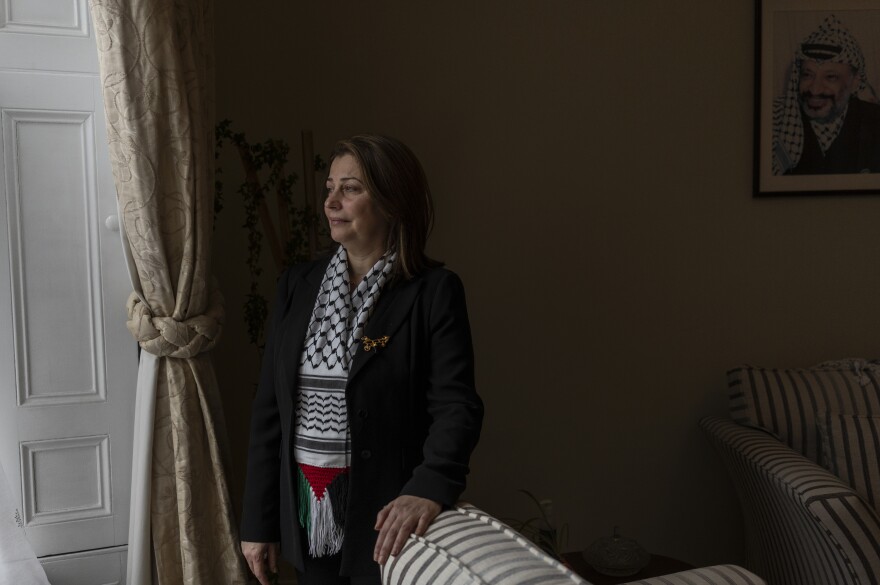
"I always find open doors — open doors, open hearts — and [Irish government officials] listen. They are really willing to help," the Palestinian ambassador to Ireland, Jilan Wahba Abdalmajid, told NPR in an interview at her office.
Earlier this year, the U.S., Britain, France and others suspended aid to the United Nations' Palestinian relief agency, UNRWA, after Israel accused some of its workers of participating in the Oct. 7 attacks. But Abdalmajid says she had no fear Ireland would do the same.
"Not at all, not at all! Because the Irish government knows exactly the vital work of UNRWA," says Abdalmajid, who hails from Gaza. "Every year, the Irish minister of foreign affairs visits Palestine, and this past year he visited UNRWA schools."
The European Union has since resumed its UNRWA funding.
But there's another, darker chapter of Irish history
Ireland was officially neutral in World War II, though historians say that policy was applied unevenly.
For example, Nazi airmen whose planes went down over Ireland and Nazi sailors who shipwrecked on Irish shores were held prisoner by Irish authorities through the end of the war. But their Allied counterparts were allowed to cross into British territory to keep fighting. When the German Luftwaffe bombed Northern Ireland in the so-called Belfast Blitz of 1941, firefighters from the neutral Republic of Ireland crossed into the North to help in the relief effort.
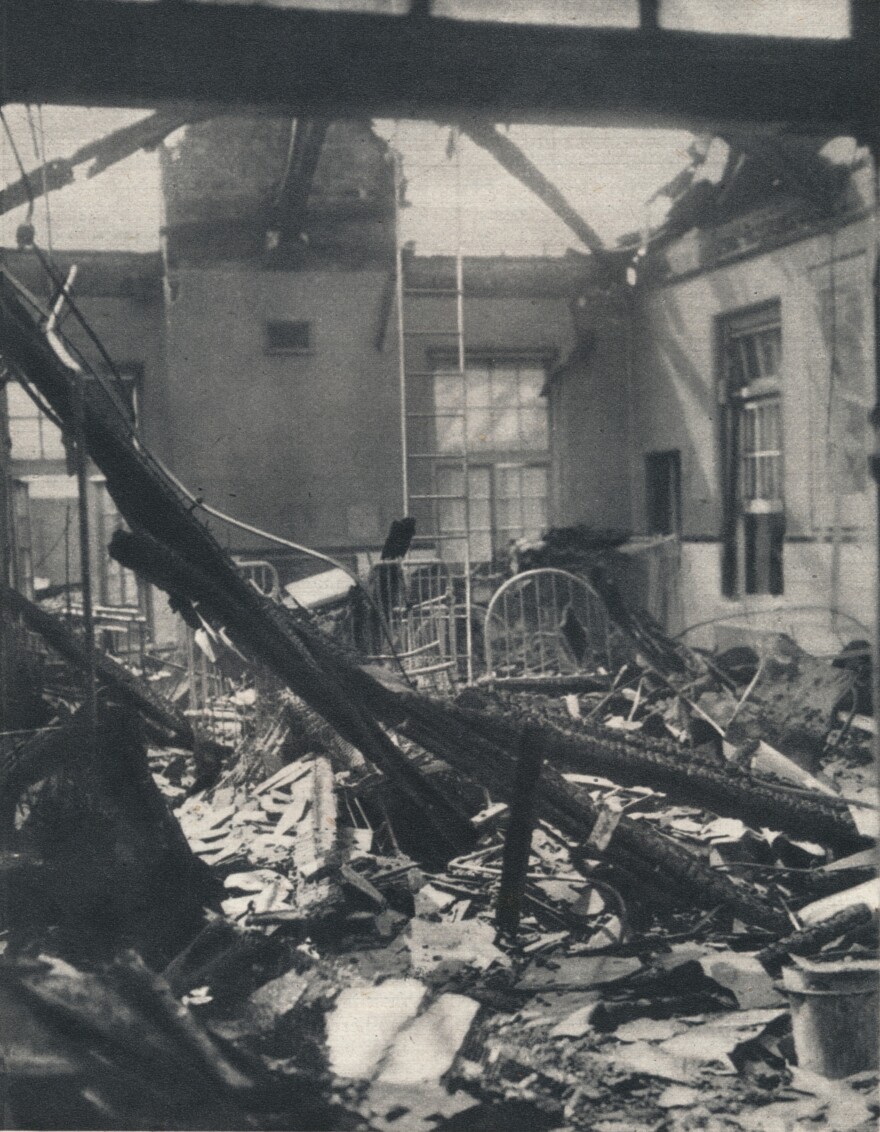
And it was the Irish who stealthily sent the Allies up-to-date weather reports that helped them stage the 1944 D-Day landings in Normandy, France.
Throughout the 1930s and 1940s though, the IRA — not part of the Irish government — was collaborating with German military intelligence. After the IRA in 1939 launched a sabotage campaign of bombings in England, Adolf Hitler agreed to send money, transmitters and spies to Ireland to help. There's even some evidence that the IRA provided the Nazis with targeting information ahead of the Belfast Blitz.
The most notorious chapter of Ireland's WWII history came upon Hitler's death: Ireland's wartime leaders — President Douglas Hyde and Prime Minister Éamon de Valera — both offered official condolences to Germany's envoy in Dublin.
This was in 1945 — after the horrors of the Holocaust were known.
After the war, Ireland also allowed some Nazis to resettle there. Among them was Otto Skorzeny, whom the BBC has referred to as Hitler's "scar-faced henchman," who famously rescued Italian dictator Benito Mussolini from captivity.
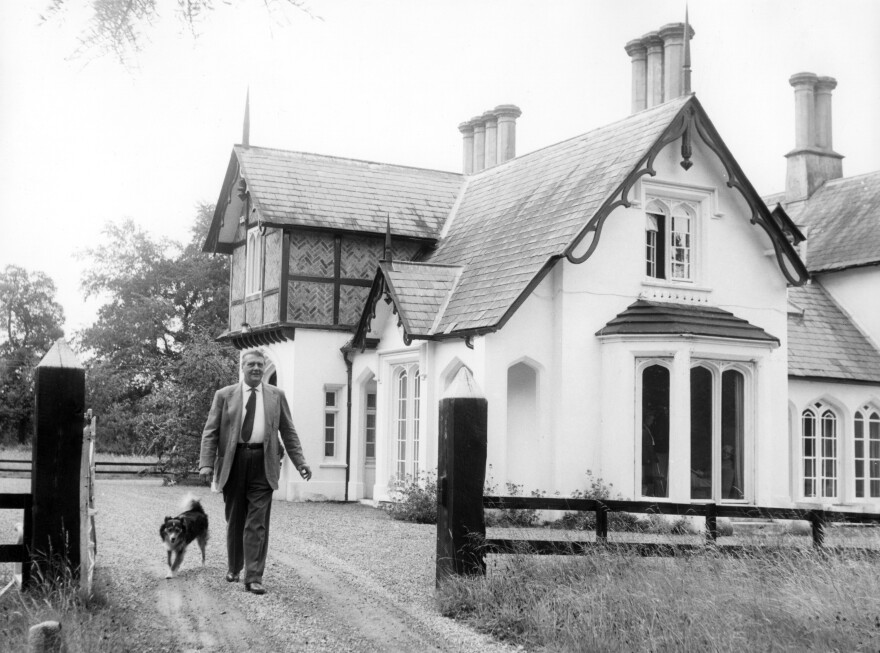
In WWII, some Irish saw an enemy of an enemy as a friend
Historians say Irish neutrality was more about opposing Britain than out of any love for the Nazis. Ireland gained independence from Britain in 1921, barely 20 years before the onset of WWII.
"These same British military and political leaders had been trying to butcher people in Ireland a couple of decades before," says Andy Clarke, the Belfast historian behind Tanistry, a popular Instagram account about Irish history and politics.
So it was difficult for the Irish to stomach any alliance with Britain, he says.
"Ironically enough, Ireland started off as pro-Israel. A lot of Irish people back in the early 20th century identified with this idea of this displaced people who have gone through turmoil throughout history — just like the Irish," Clarke says. "And the idea of them getting their own state, their own home appealed to a lot of Irish people. They said, let's give them somewhere safe."
The current Israeli president, Isaac Herzog, traces his own ancestry back to that era. His father and grandfather were both born in Ireland. The latter served the country's chief rabbi, nicknamed the "Sinn Féin Rabbi" for his republican politics and fluent Irish language.
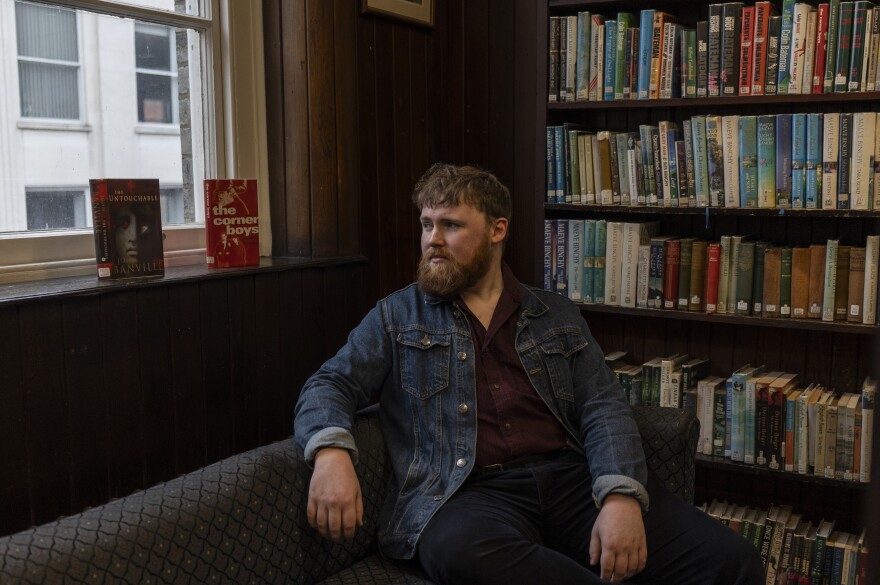
It was well after Israel's founding, Clarke says, when it annexed and occupied more Arab land, that Irish public opinion flipped pretty dramatically.
But those Irish signatures on a book of condolences for Hitler, in 1945, have become an enduring source of shame for many Irish. The legacy of Ireland's wartime prime minister is mixed, says the podcaster Chambers.
"De Valera was important in the fight for Irish independence, but the things that he did afterwards [hurt his legacy]," he says. "He made Ireland a very conservative, oppressive place, which almost had parallels with the likes of [dictator Francisco] Franco in Spain — a real conservative Catholicism."
By 1945, Ireland's neutrality looked like a sham — it was apparent de Valera favored the Allies — so he felt compelled to make a gesture toward the other side, Clarke says. The German envoy in Dublin, to whom de Valera paid his condolence visit upon Hitler's death, was regarded as an "anti-Nazi," and a personal friend of the prime minister, Clarke says.
Nearly 80 years later, de Valera is not seen as a Nazi sympathizer — neither in Ireland, nor Israel. In fact, there's a forest dedicated to him in northern Israel.
"So when people say Ireland was antisemitic in World War II, it's almost weaponized against people in Ireland who want to speak out against Israel," Clarke says.
It's not just politics. The Palestinians feature in Irish music and art
Today, support for the Palestinians feels most pronounced in Northern Ireland. Many Irish nationalists there compare their situation under British rule to Palestinians under Israeli occupation.
Some of the region's most popular musical acts, including the hip-hop trio Kneecap, are vocal about their support for the Palestinian cause. Indie rock band The Shan Vans even sing about it in the Irish language.
In The Shan Vans' signature song, entitled Shan Van — which means "the old woman" in Irish — lead singer Jake Mac Siacais croons about Irish hunger strikers in British jails during the Troubles, and Palestinians in Israeli ones. His father and grandfather were both imprisoned during that period, he says.
"Stigh lom nocht sa chillín. Pluid timpeall mo mhéin. Ón taobh istigh tá solas. Don Phalaistín i gcéin," he sings in Irish.

The English translation is "Lying naked in a cell, a blanket 'round the mind. From the inside, there is a light — far off in Palestine."
Like the British colonial governor of Jerusalem, Ronald Storrs, Mac Siacais too sees Israel as a Western colonial project. That's not how much of the world saw Israel in its nascent years, and it's something Israeli and Western leaders vehemently deny. But it's nevertheless how many Irish see it.
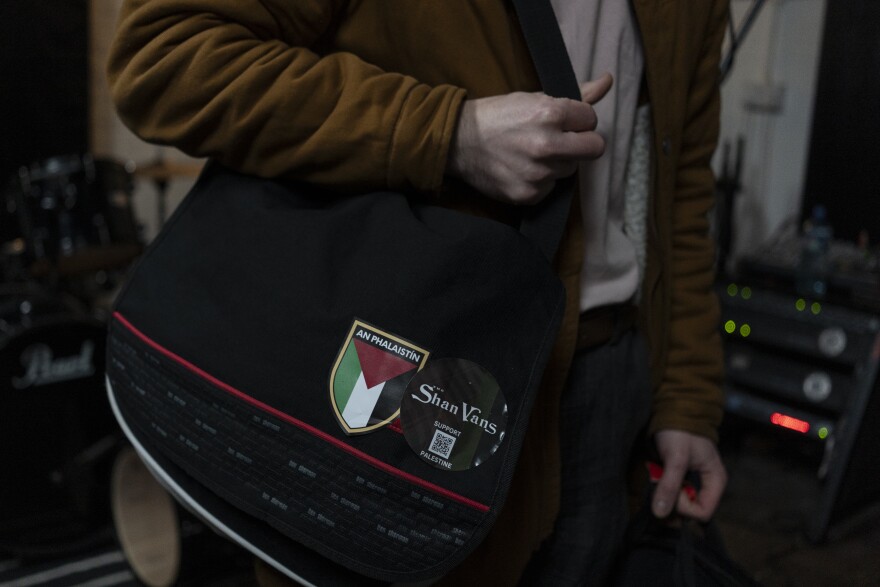
Mac Siacais calls his song an "analysis of Ireland and Palestine and their anti-colonial struggles." He hopes to expand it into a short film. By singing in Irish, about the Palestinians, his band is "trying to make an argument for all indigenous cultures."
"We see Ireland as the first European settler colonial project," the singer told NPR in an interview at his rehearsal space, in a disused Belfast warehouse. "We as artists feel that there's a need to talk about that — about our experience with decolonization in a Western European society."
Irish support for the Palestinians isn't limited to politics. It's become a cultural movement.
All of the Irish bands that were scheduled to perform at South by Southwest this month have pulled out of the Texas music festival, over its links to the U.S. Army, defense industry and weapons sales to Israel. Several U.S. bands have done the same.
Some of Ireland's most renowned actors and writers, including Sally Rooney, Anna Burns and Siobhán McSweeney, are also part of a group called Irish Artists for Palestine, which fundraises for Gaza, supports the work of Palestinian artists, and says it works to strengthen cultural ties between the two nations.
Athletes have joined in, too. Last month, Ireland's women's basketball team refused to shake hands with their Israeli opponents at a EuroBasket qualifier – after an Israeli player accused the Irish of antisemitism. A top women's soccer team in Dublin plans to host a friendly match with the Palestinian national team in May, as a fundraiser for Gaza.
In Belfast, the city's famous "International Wall," which has long featured murals about global human rights causes, has been repainted this winter by local artists — some of them collaborating remotely with Palestinian artists — with murals solely dedicated to the Palestinian struggle and suffering in Gaza.

Sending support from Dublin to Gaza
Since the start of the war in October, Al Tamimi, the Palestinian activist and educator in Dublin, has been in constant fear for her sister, who's trapped in Gaza — internally displaced several times.
Al Tamimi says she gets text messages from her, describing having to walk for nine hours, past tanks and snipers; watching an elderly man shot dead in the street; and sleeping with 14 people in a small room with no window, no electricity and no food. "It's miserable," Al Tamimi says, her eyes welling up.
Meanwhile, Al Tamimi has helped organize weekly pro-Palestinian rallies across Ireland, where she's lived since 1988 and has become a citizen. She's now the vice chairperson of the Ireland Palestine Solidarity Campaign, a nonprofit human rights group.
Al Tamimi often leads chants of "Free, free!" with an overwhelmingly white, Irish crowd responding, "Palestine!"
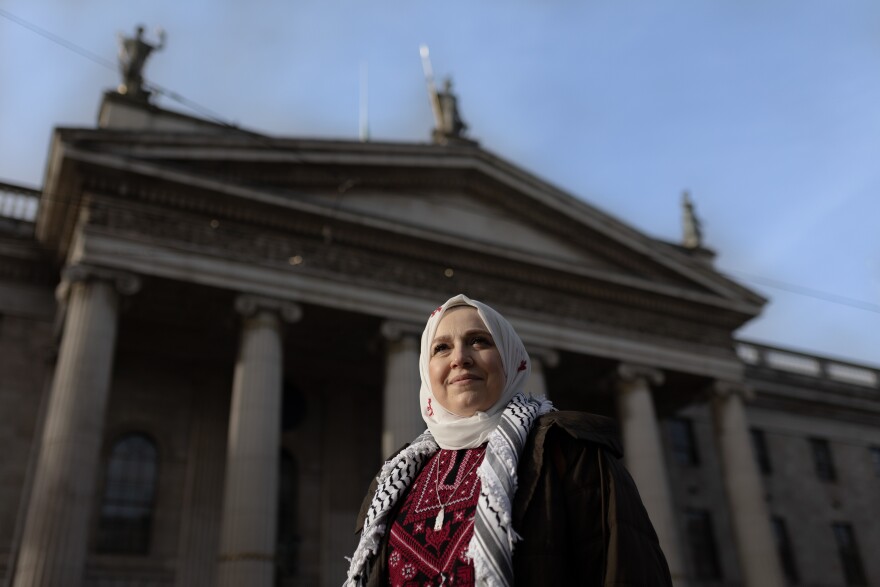
In an NPR interview in front of Dublin's General Post Office — a 19th century neoclassical building still pockmarked with bullet holes from 1916, when it was at the center of the Easter Rising against British rule in Ireland — Al Tamimi says she's had a "beautiful reception" in Ireland. "It keeps me going," she says.
She tries to convey to her sister what she's seeing on the streets of Dublin, to buoy her spirits in Gaza.
"We cannot leave hope behind," Al Tamimi says. "The Palestinians look up to Ireland. We're really, really grateful to them."
Copyright 2024 NPR. To see more, visit https://www.npr.org.









